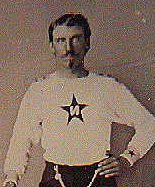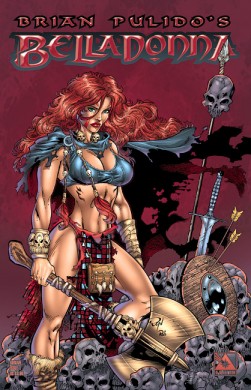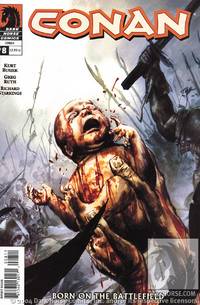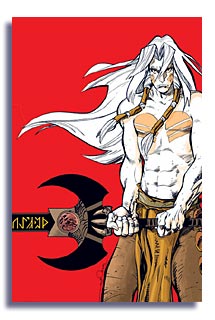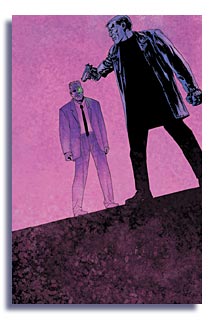|
|
|
|
Jason
Schachat is not the droid you're looking for...
|
Jason Schachat's Weekly Breakdown
September 24, 2004
Each
week, Jason Schachat takes you along for his ride on the
four-colored pulp pony. Feed the addiction, and the addiction
feeds you.
You know those days when you order a Star
Wars Trilogy DVD Boxset, and you wait for your Star Wars
Trilogy DVD Boxset, but the Star Wars Trilogy DVD Boxset
doesn’t come, so you read some comics to get your
mind off the Star Wars Trilogy DVD Boxset, but all you can
think about is your Star Wars Trilogy DVD Boxset?
Dammit.
Avengers
#502 confirms many of our worst fears: A)
The United Nations UNANIMOUSLY voting to disavow the team
in the span of a day summarizes the painful sloppiness of
this whole concept. B) The sudden appearance of an angry
Kree battle fleet sets new standards for Plot Convenience
Playhouse. C) The disgustingly unsurprising death of a team
member who dates all the way back to the days of Jack and
Stan (…two American kids doing the best they can…)
proves Bendis isn’t even in this for the shock value.
D) The cliffhanger involving an ally’s epiphany that
THINGS ARE NOT WHAT THEY APPEAR whacks us in the face with
a huge “Hey, kids, you’re being f***d with!”
sign.
I’ll be as fair as can be, here. I’m
not a longtime Avengers reader. I don’t feel a bond
to these characters that goes all the way back to my childhood,
I can’t name about half the members of the extended
team who showed up last issue, and I’m all about seeing
Captain America as a man of action rather than a quiet,
thoughtful team leader (leave that to Black Panther).
Aside from what is admittedly an awesome
death scene for a long time Avenger, this issue is a boring
fight with stock villains bookended by some “What
the hell’s going on?” dialogue. Bendis’
“Chaos” arc has committed the sin of copying
Alan Moore’s immortal Superman “Whatever Happened
to the Man of Tomorrow?” story with half the excitement,
half the intrigue, and double the issues. Only check this
one out if you’re REALLY desperate for a few pretty
pages of big explosions and laser blasts.
|
|
|
Hmm...the
cuffs don't match the tartan...
|
I’ll
also admit a lack of knowledge concerning the works of Brian
Pulido. All I know about Pulido is he does Lady Death, and
all I really know about Lady Death is I had to constantly
clean drool off the countertop underneath her poster at
the comic shop I worked at. Brian Pulido’s Belladonna
#1 seems to be following the same guideline
that putting a busty avenging angel in skimpy undergarments
and a cape is grounds for a comic series.
This time around, we get a story set in
the aftermath of Norse raids upon Ireland in the 10th century.
On Samhain (Halloween), a woman dressed in the garb of a
Celt appears from the shadows to claim revenge for a Norseman’s
cruel murder of an innocent Irish family. However, when
vengeance is had, Belladonna reflects on her rage and her
power, asking what has become of her. Is she a ghost? What
happened to her former life? Are these Norsemen responsible
for destroying the last hope for peace in Ireland?
To tell the truth, I don’t really
care. The story’s all very standard “I must
have my revenge, blah blah blah” that doesn’t
give us any characters we particularly care about or a strong
enough conflict to keep us involved. And it’s been
a while since I’ve brushed up on my Norse mythology,
but I could swear that Hel was a person rather than a place,
so when Bella tells a Norseman his kin are rotting in Hel…
well, that’s not GOOD, but I don’t think it
means what Pulido intends. Besides, doesn’t every
realm in Norse mythology end in “–heim”?
See,
this is what happens when you make a comic that’s
even remotely close to historical fiction and don’t
give it enough plot to keep these questions from bobbing
to the surface. I don’t know what the creative team’s
intentions are on this book, but if you buy it for anything
other than a voluptuous Irish chick bursting out of the
Celtic equivalent of a bikini (which really has to chafe,
when you think about it… (See?! I’m thinking
about it again!)), you’re wasting $3.99 on this 22-pager.
Wanna
talk about a different kind of waste? Well, after Catwoman
managed to grab 13,000 new readers last month, I figured
it might be worth taking a look at what all the commotion’s
for. Wasn’t ‘til after buying it I looked at
the cover and realized friggin’ “War Games”
is still going on (this is what I get for having the clerk
pull issues for me). Worse yet, the Catwoman entrees
in the story haven’t been the series at its best,
and I doubt the new readers will stay past the crossover.
Issue
#35 finds Spoiler in chains, Orpheus dead,
Catwoman battling Cheshire’s old gang, Batman taking
over Oracle’s communications center to order the Gotham
City PD around, and lots of explosions and fire and stuff.
If you have no idea what I’m talking about, you now
realize why it’s not a good idea to review issues
in a crossover.
Ed Brubaker fares better than he did with
last month’s obligatory car chase and big reveal,
but Paul Gulacy’s art is still an eyesore. He gives
us some nice detail here and there, but his sense of proportion
is schewed, fight choreography is hard to follow, and characters
are capable of about three expressions: bored, stunned,
and screaming. Of course, I’m still pissed at how
his minor tweaks of Selina’s costume have shifted
it from the realm of practicality into unrealistic quasi-fetish
gear (unless you consider skintight leather jumpsuits with
giant belt buckles (yet no belt) and huge O-rings mounted
just beneath the chin in perfect position to loose someone’s
head from their spine practical, that is).
Not
having read the rest of “War Games” I can’t
really say if it’s a must have for those following
it, but the issue seems important enough (especially since
it features Bats’ most fascist move I’ve seen
in a while). The rest of us need not bother.
I’ve
refrained from reviewing the City of Heroes comic
because it hasn’t been particularly stellar, and I
previously thought you could only get it free with subscription
to the game. This month… well, nothing’s changed,
but since ICv2.com ranked the last issue as the 271st best
selling comic in July with 1,891 sales, it’s open
season! (There are enough CoH subscribers to put the comic
in the top ten if they counted free issues, so I’m
assuming 1,891 people actually bought the damn things.)
City
of Heroes #4 continues the book’s second
arc with the hunt for Carnivale villains for… some
reason. Can’t really remember. Something to do with
drugs. Anyways, Apex, War Witch, and Horus run around the
city beating the tar out of various types of baddies from
the game in more of an attempt to pander to the gamers than
accomplish anything heroic. The big appeal of this issue
was rumored to be its first ever inclusion of a player’s
hero character. I’m guessing the newly introduced
Kayla is said hero from the way she suddenly appears and
disappears, but her look is too different from the CoH models
to be sure. She’s dull enough to fit the bill, though.
As a
comic, City of Heroes suffers from a lot of the
same weaknesses as the game. The heroes and their missions
lack depth, villains usually seem to be there so the heroes
have something to do, and it doesn’t take long before
you realize they’re giving you the same thing over
and over again. With the game, I can understand it takes
a long time to implement design changes that’ll advance
the story beyond smacking bad guys around and facing the
same old cackling archvillains in their dark lairs. With
the comic, they really don’t have that excuse.
Rather
than pull from the interesting initial concept of, oh, a
CITY FULL OF HEROES, City of Heroes follows buddy-cop
formulas and generally ignores the backstory and intrigue
that keep the game involving. In the attempt to be accessible
to non-players, a story that had some appeal in the preview
issue has become so watered-down even the gamers won’t
have any interest beyond the history lessons in the back
of the book. The art isn’t awful but isn’t great,
either, and the dialogue is neither as clever nor as humorous
as it tries to be. Frankly, you should only be reading this
if you’re subscribing to the game. But don’t
subscribe beyond a recurring monthly plan or start off playing
as anything other than a Blaster or Scrapper. Trust me on
this.
|
|
|
You
think you've had a bad day?
|
Last
month’s Conan wrapped the
Aesir/Hyperborean arc so completely, Kurt Busiek and company
decided it was best to head back in time to Conan’s
childhood for issue #7’s “Born on the Battlefield”.
We return to the Prince and Wazir of issue #0 pouring over
the scrolls that tell of Conan’s rise from lone barbarian
to mighty king. But the Prince interrupts his Wazir and
commands that he tell of the hero’s childhood (despite
the Wazir’s insistence that such tales will be largely
myth). The story then follows the boy Conan from his birth
in the heat of battle to his early experience with the sword
as he proves, even at that age, to be one blessed with abilities
that draw men and women alike to his side.
Perhaps the greatest difference with this
issue is Greg Ruth’s gorgeous artwork. The roughly
painted style harkens very close to Cary Nord’s work
on the series, but the feeling is quite different. Nord’s
work felt raw, rough, and savage. Ruth’s work leans
more to the artist’s photo-realistic mastery and details
it with a few layers of dirt and grime. The color palette
is a bit duller than Dave Stewart’s, and the overall
effect is a darker, less adventuresome tone.
However, the story doesn’t suffer
at all and it makes for a nice jumping-on point as well
as a surprisingly good fill. One to buy.
Unfortunately,
I can’t give Cosmic Guard #2
the greenlight. I say “unfortunately” because
I really had hope for this series based on the first issue’s
promise of a new Green Lantern/Captain Marvel (Marvel’s
Captain Marvel… er, Marvel’s OLD Captain Marvel,
that is). This month demonstrates a closer tie to the power
fantasy rather than the space adventure.
Ray, our newly appointed Cosmic Guard, learns
of the evil Genociders who threaten all life in the galaxy—
but then he also discovers he’s still just a twelve
year old orphan who needs to will the power of the Legacy
if he’s going to fight anybody. So, most of the issue
follows Ray through the orphanage as he gets acquainted
with a few of the local psychos and learns of a fiendish
plot involving unwilling organ donations.
Naturally, I’m disappointed by the
way the story seems to be heading (at least for the immediate
future), but this issue fails even more in the art department,
relying on ugly gradients for most of the coloring, undetailed/photographic/absent
backgrounds, and some freaky character designs. Jim Starlin’s
Dark Paladin is a far more interesting sight than Ray, and
I’d rather see the Genociders decimate another planet
than stare at the bizarrely decrepit walls of the orphanage.
Hopefully, this book will veer back towards the cosmic in
a hurry. The page where “a new player enters the game”
was enough of a tease to keep ME coming back, but this book
needs to ditch Earth and give us some more robots and aliens
if it’s going to make it to issue #4.
Brian
K. Vaughan uses Ex Machina #4
to make one hell of a statement about art vs. the “art
world”. Oh, and he also has the hero save a guy from
a fire and builds up the whole mystery of the man killing
snow plow drivers. That’s cool, too. But, man, does
he give a nice slap in the face to critics and culturati
when Journal confronts the artist responsible for the “*igger
Lincoln” painting that’s brought so much heat
on Mayor Hundred. It’s a great commentary on artists
and art scenes, but also serves as a slick examination of
the human condition and lack of communication in today’s
uber-communicative society. Journal wears a silly hat while
doing it, too!
And Tony Harris draws people better than
anyone has a right to. We all know he has the ability to
give us completely photo-realistic art, but the compromise
he makes to give subtlety and nuance to these characters
is near perfection. Ten years ago, work of this kind was
still overshadowed by the heavily hatched monstrosities
that ruled before the refinement of computer color. Man,
is it good to see THOSE tables turned. Definitely recommended.
On the
other hand, anyone hankering for some fantasy from old school
masters is sure to get a kick out of Michael
Moorcock’s Elric: The Making of a Sorcerer #1.
Set as a prequel to Moorcock’s Elric saga, this new
mini finds the Prince of Melnibone as an anemic youth struggling
against a treacherous cousin and faithless father to attain
his rightful place on Melnibone’s throne. But what
Elric lacks in brawn he makes up with sorcery and cunning.
Entering the first of four dreamquests, Elric finds himself
in the foundling days of Melnibone during a conflict with
the dwarves which centers around a certain mystical runesword
and its involvement with the dragons that live in the earth.
After god knows how many years of limp fantasy
and shallow adventures which manage to wedge a few dragons
onto their pages, it feels damn good to get a solid High
Fantasy hybrid from a couple of the masters. This is some
definitive Walt Simonson, here, and nothing feels tired
or trite. The dragons, dwarves, demons, giants, and demi-gods
are unique and powerful designs, and the world of Elric
taps into fantasy trappings without looking like another
Lord of the Rings clone.
Moorcock’s approach to the story pulls
from the strengths of sword and sorcery, setting up medieval
power struggles in the background while the dreamquests
drive the narrative. The result is a captivating adventure
that delivers visceral action AND the strong storytelling
of literate fantasy. Definitely recommended.
So,
what would happen if Martians harvested Adolf Hitler’s
brain, grafted it to the body of their emperor, slowly infiltrated
America in the 1950’s and declared outright war in
1969? Well, clearly, Mr. Monster would rise up to save the
day as he does in Mr. Monster vs. The Nazi from
Mars (“or Mr. Monster: Worlds War Two
whichever you feel is the catchier title”). Blending
the wacky lack of sensibilities that characterized WW2 propaganda
comics, cheesy pulp Sci-Fi, and 60s/70s underground comics,
Mr. Monster boldly strolls through a bizarre alien invasion
with the look of Mars Attacks! and the joyful bloodletting
of a Duke Nukem game.
Duke Nukem… wow, I’m getting
old…
Nevertheless, Mr. Monster is a delightful
pleasure for anyone hankering to see new ways to kill Nazis.
It’s a bit shallow and action-heavy for the price
tag (not to mention scientifically flawed in every possible
respect; probably intentionally), but it works for anyone
desperate to see Martian Stormtrooper brains splattered
across the pavement by a chainsaw sword.
In this
week’s edition of “Deserving Characters Who
Finally Get Their Own Series”, we take a look at the
all-too-long awaited Nightcrawler #1.
Following the bloody murder of a hospital room full of children,
Storm gives Nightcrawler the task of investigating the mysterious
incident (figuring his gentle demeanor will more than make
up for his ghoulish appearance). But, upon reaching the
hospital, he finds a vixen night nurse, a night watchman
with a dark secret, a brooding, suspicious supervisor, and
a traumatized child whose reaction to Nightcrawler may be
a clue to the evil forces at work.
I’m
pretty torn by this issue. I’ve loved Darick Robertson’s
artwork from JLA to Transmetropolitan
to Wolverine, and, despite an odd looking Nightcrawler
in the latter title, he really comes through on this issue.
But Roberto Aquirre-Sacasa doesn’t really give him
much to do. The story’s very simple and the art follows
it. Yet… it almost pains me to say it… but this
is one of those characters that would actually work if Marvel
tried to Manga-fy him.
Hear me out on this one; Nightcrawler is
a good looking, sensitive young demon guy who’s earned
his stripes as a swashbuckler. And the girls go for him.
Give him a samurai quest or something and you’re on
the road to manga. More importantly, Nightcrawler’s
sensitive side gives you an opening for romance that young
women might go for. Of course, you’d have to abandon
the gritty, realistic look to make him a bit more appealing.
Hence, manga.
Of course, longtime X-fans may scoff at
such a thing, and I can understand them wanting Kurt to
play a dark detective role, but I just don’t think
that suits him. The whole irony of Nightcrawler is that
he’s the nicest guy in the world yet looks like a
monster (a cuddly one, admittedly). He’s not a killer
or a brooding chronic depressive. This man loves people
and the world we live in. Nightcrawler is nice and all,
but the approach isn’t particularly exciting. It’s
a decent read, but I can’t see it lasting a long time
unless things change soon.
In this
week’s edition of “Characters Who Don’t
Deserve Their Own Series But Get It Anyway”, we take
a look at Rogue #3. Figuring that
if her old flame Gambit could start his own series without
giving me an aneurism, she deserved a shot, I caught up
on this series and found it to be remarkably less than revolting.
Not earth-shattering, but this exploration of Rogue’s
roots (her background, not her dye job) finds some appeal
in its odd journey into shamanism and dreamwalking.
We pick up where we left off when Rogue
encountered her doppelganger and let her slip away just
before the mysterious new Gambit-wannabe in her life strolls
up and tells her where the shaman her mother and father
followed to the “Far Shore” can be found. Unfortunately,
the old native is comatose, so Rogue has to whip off a glove
and reach into his memories to learn that it was her father’s
hubris that took her mother away from them and dispersed
the commune they lived in.
Oh, and then weird ghost things attack when
Rogue snaps out of her trance.
As comics
go, Rogue isn’t one I think I’ll be
reading much, and I still don’t feel it can last as
an ongoing series, but I will admit that scribe Robert Rodi
has played to the character’s few strengths very well.
Far too much of Rogue’s career has been spent as a
whiner, musclehead, or both. Most stories use her as a plot
convenience or showcase her ability to steal powers when
the far more interesting story device is her memory absorbing
ability, and Rodi knows it all too well.
There are too many loose threads and perplexing
elements whipping around right now for me to recommend Rogue
to any but Rogue fans, though I will say it’s better
than I would’ve expected and trounces recent stories
on the main X-books. Not that that’s hard to do.
|
|
|
Hey!
That's not the cover I got...
|
Lacking
significant bloodshed or wall-to-wall swearing, Sleeper
#4 earns its “Suggested for Mature Readers”
label this month by spending nearly half the issue in a
titty bar! Which is not to say the book doesn’t regularly
feature more strip clubs than the entire Marvel catalog
combined, but this issue is more of a quiet intrigue builder
than a shootout.
Holden, our good guy turned bad guy turned
good guy turned bad guy (or triple-crossing sleeper agent),
figures out that former boss and spymaster Lynch has used
his buddy Triple X-Ray as a go-between to set up a secret
meeting. Of course, Ray would also be screwed if he told
anyone Holden was working with the good guys again, but
Holden’s more concerned about getting his friend out
of harms way when Lynch’s “distraction”
comes barging into the club, allowing him to slip away in
the chaos. Holden doesn’t really have anything to
say to the old man, of course, but Lynch has some interesting
information involving a wayward alien and how it might be
able to extract the super-powered artifact that both gave
Holden superpowers and completely ruined his life.
All
in all, this is a pretty quiet issue, but, let’s face
it; ever since we got over the confusion of the Sleeper
season one #1, there’s never been a bad issue.
Ed Brubaker keeps us delightfully in the dark about damn
near everything but shows enough of Lynch and Holden’s
backstabbing to keep readers hooked. With next issue’s
promise to delve into the feud between Lynch and Tao (Holden’s
criminal mastermind employer and a former member of WildC.A.T.s),
Sleeper’s as addictive as ever. Even on a
day off. Recommended.
There’s an old comic writing guideline
Stan Lee went by which Alan Moore also adopted that has
been recommended by Warren Ellis, as well: Try to stay under
23 words of dialogue per panel. (For anyone keeping track,
that roster stretches all the way back to the Golden Age
and could be called fathers of the Silver Age, Bronze Age,
Modern Age, and Fourth Movement (aka they have a good idea
what they’re talking about)). It’s a simple,
logical, straightforward concept to make people sound natural
and keep the story flowing.
…and
The Walking Dead has pissed on
aforementioned guideline more times than I can count. It’s
still frickin’ brilliant.
Following the relatively quiet change in
locale last month, issue #11 finds us on a farm where the
patriarch keeps his undead neighbors in the securely locked
barn. This revelation stuns Rick, whose solution has always
been to kill the zombies, but things come into focus when
the farmer says his fallen son is in the barn. Rick still
pleads that the farmer’s son died and the zombie is
nothing more than a monster, but the farmer angrily insists
he has to keep them locked away until a cure can be found.
Most
of the characters begin to settle into the comfortable surroundings
of the farm, but Allen, the man whose wife died the last
time things got “comfortable” still teeters
on the brink of madness, questioning whether he can even
go on living, even if it’s just to care for his young
sons.
Rick
starts up another shooting lesson with the latest additions
to his weary band, and things seem fine until the farmer
rushes out to stop them from damaging property, only to
notice a withered form staggering out towards the sounds
of gunfire…
The
Walking Dead could probably feature an entire issue
about proper kitty litter maintenance and it would still
be riveting. With the constant threat of zombies and unfriendly
survivors lurking around every corner, readers can’t
help but be on constant alert. Especially when it seems
like there’s no reason to be. But Robert Kirkman’s
unapologetically wordy human drama gives us so much in one
issue it’s impossible to be let down (please be impossible,
please be impossible…). Charlie Adlard’s art
still doesn’t thrill me like Tony Moore’s did,
but there can be no doubt that it fits the book and delivers
every time.
The
Walking Dead is the best book this week. The Walking
Dead may be the best book every week it comes out.
Hell, The Walking Dead may just be the best comic
book, period.
Hot Predictions for Next Week: Adam
Strange #1, Caper #12, Daredevil #65, DC: The New Frontier
#6, and Guardians #4.
|
